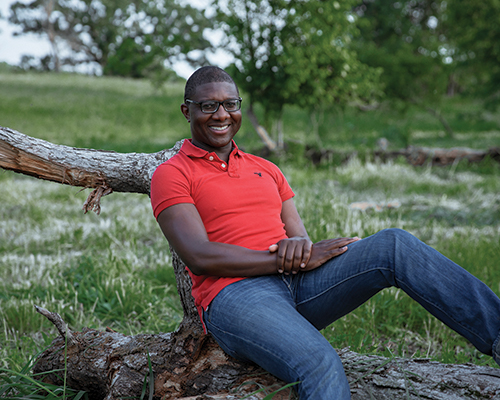Boynton, Oklahoma: To say it was a small town is to overestimate its size. The town sits along Highway 69, and if you blink you may just pass right through.
If you pause and look off to the side, you will see a house sitting in the middle of a field. That house is where I began. My mom starting having labor pains around 2 a.m., but because the car had a flat tire, there was no way to get her to hospital. I was coming out (for the first time)! In a room in the home of my grandparents, I took my first breaths. As my grandmother ran frantically around the house, my aunt delivered me. My grandmother’s best friend’s sister, a nurse, cut the umbilical cord—if not my connection to Boynton.
My close family is small in size. There was my grandfather, a Korean War vet who became a police officer; my grandmother, who worked for years with students at the School for the Blind in Muskogee; my aunt and her two children, and of course my mom and my sister.
I did not have much of a relationship with my father. Two memories I have with him—nearly being bucked off a horse and being scared out of my mind as I rode a motorcycle with him—aren’t all that fond. I can’t say that I like or dislike him—that would require that I spent time with him. I never had feelings of inadequacy. I never pined away wondering why he never called, wrote, or expressed to me a desire to form a connection. Growing up without him was just normal. I had my family.
How might I have turned out had he been a regular feature in my life? Who knows? Learning things like shaving and tying a necktie were things I did on my own. The biggest male influence in my life was my grandfather. He was 6’2”, but in my mind he was a giant. He was a man of faith and strength. I remember countless times sitting at his feet (he had a favorite chair) while we discussed space, black holes, and other scientific phenomena. As a young, scientifically precocious child, I felt as though I had been listened to and not just humored.
Spending summers in Boynton was always fun. I remember my grandfather coming home with treats after having stopped at the “bread house” (what we called the Wonder Bread store that sold Little Debbie snacks). Early one morning he set out to spend the day with his brother. It was a typical day—we were just waking up as he was leaving. I remember seeing his image in the doorway as he said, “I’ll see you all later.” My grandmother, sister, cousin, and I spent the day running errands. We returned and saw his truck parked in the yard but all the lights in the house were off. We walked inside and found him laying on the floor in the bathroom. He was conscious, but not able to speak. My grandmother called for paramedics. I ran to his side. Boynton didn’t have paramedic service, so the nearest ambulance was 20 minutes away.
We learned later that he had suffered a stroke. When he got to the hospital his conditioned worsened. I remember walking down the hall of the VA hospital in Muskogee, and my mom saying to me, “Papa has passed.” It was the first time someone so integral to my life had died. In the many years since then, I have so wished he could have seen the person I have become.
The Ambassador?
I was born in Boynton but McAlester, known as “Little Dixie,” was my hometown. It has a very small black population. In ninth and tenth grade, when I started taking Pre-AP courses, I was “the black kid” in class. I was always the token person of color in class. It was isolating.
When the only diversity shown is a National Geographic film depicting “primitive” tribes in Africa or slaves in the Deep South, being the lone person of color becomes the altar upon which others feel the need to lay their burdens. I was the ‘go-to’ person if there was a discussion about slavery in history class, the person from whom approval was needed when answering a question.
At the same time that I was the Black Ambassador I also faced ridicule from other black students. I “talked white.” I was “proper.” Because I was an honors student, I was somehow more white than any other black student. For some time growing up that treatment prevented me from making black friends. I was always nervous that I somehow would not be “black enough” for them. Thankfully, time and maturity have moved me away from those feelings.
Spending time as the only person of color in school did lead to some humorous moments: Each nine-week period, my middle school forced the students to participate in a sporting event. This particular time it was basketball. I was not particularly athletic. There I was, though, the only black kid on the court, students filling the bleachers, the intensity of the beginning of the game hanging in the air. A break: my team had the ball. Players began to jockey for position. I was on the court, glasses and all, doing my best to make myself open.
“Don’t pass the ball to me,” I thought to myself. Suddenly, I heard a voice over the din of the crowd: “Pass the ball to Mario!” My heart stopped. Time stopped. All I saw was that tan sphere moving slowly toward me. As it inched on, my mind raced, plotting my next move: Catch the ball! Pivot! Catch the ball! It seemed so easy in my head. Without warning—smack! That slowly moving ball crashed into my face.
My glasses flew off. There I stood, embarrassed and unable to see. As I scrambled to get my glasses, the other team got the ball and scored. The only consolation for me was that I could not see what was going on.
Unpackaging myself
After tenth grade, I left McAlester to attend the Oklahoma School of Science and Mathematics, a two-year, residential high school. The school’s demographics were different than McAlester. My class had 75 students. While I was one of two black students in my class, there were other students of color as well as students of different religious faiths.
It was in this setting that I began to grapple with my own sexuality. The feelings and thoughts I had about being gay were strange. I didn’t know how to process them. In fact, it took me some time to even admit that I had those feelings. I did my best to push them aside. I tried to convince myself that I was attracted to women. I went with a female friend to prom. I told myself that I had infatuations, crushes, on some of my female classmates.
No matter how I tried to be analytical and rational about things, my true feelings remained. It was the first place that I actually had the internal monologue about being gay. I would see people and have (what I considered then) improper feelings. “I can’t be thinking this other guy is cute. That’s not how I was raised. What will people back home think?”
The first time I put my thoughts on paper was July 27, 1997. Two months earlier I had graduated from OSSM and I was back home in McAlester waiting to go off to college. I was given a journal and had started writing in it in June. My first entry about being gay: “I went to Tulsa with [friends]. One of [my friend’s friends] asked if I was gay. Well, I was definitely taken aback. But in all honesty, I don’t know if I am or am not. I’ve never had a girlfriend, but I have had crushes on girls. But part of me has seen the attractiveness in males—so I’m a bit concerned. I don’t think I want to be gay, but I know it’s not some choice to be made by me.”
So many things to unpack from that entry: my confusion, my reluctance, but also my intellectual response to it. It wasn’t a choice to be made by me. My choice was in deciding how to move forward.
I did what I thought was the right thing: I pushed the thoughts down. I created a mask to hide myself from myself. It wasn’t until college that I began to accept who I was.
September 20, 1997 journal entry: “I met a gay guy….he’s pretty cool. But now I’m faced with the whole homosexual question again. I just wonder why I should have this question to answer. None of my other friends do. Why am I the exception?” (Little did I know that the friend I’ve known the longest would come out to me after I came out to him.) The entry continues: “I have close friends, but telling them would make the situation more real. I’m not ready for that. I shouldn’t feel so alone, but I do.”
Reading those words today hurts my heart. I want to tell that 19 year old Mario, “It’s really OK! You can be out to your friends. They love you unconditionally!” I experienced that unconditional love on November 2, 1997. That was when I first came out to someone. She was my friend at OSSM and at college and remains my friend to this day. “I was so relieved when she supported me! Now every time I see her, I want to give her a big hug in appreciation!”
After that moment, it became easier to tell my friends. One by one, I opened up to them and each one continued to love me for me. As I think back on it now it just seems silly that I would be worried things would turn out otherwise. That’s the beauty of hindsight.
Student of the law
The stress of being out to friends began to wane as I opened up to more people. By my sophomore year of college, I started dating someone. We met when I was a freshman in college—he was a year ahead of me. My first year of school, we were friends. I honestly didn’t know he was gay—I’m not sure he knew either. As the year progressed, our friendship grew closer and as cliche as it is, we told each other of our feelings February 14, 1999. He stayed in Stillwater as I finished my last year of college at Oklahoma State University, and after I graduated, the two of us moved to Dallas together.
Within a couple of years in Texas, he decided he wanted to go to law school. I had a teaching job and wasn’t quite ready to leave the city. He moved to Kansas to start law school, and I stayed in Dallas one more year. I lived alone, which was quite an adjustment. I had been out of school at this point for three years and decided it was time for me to go back. I also decided on law school.
I applied to various schools, including Kansas and U.W.-Madison. Kansas put me on their waitlist, whereas U.W. accepted me. I had to make a choice: Wait to see if a spot opened up at Kansas, where my first love was, or chart a new course on my own.
I made the hard choice, but in the end, it was the right one for me.
Law is not easy under the best circumstances. Here I was, moving to a different part of the country. I didn’t know anyone here. I didn’t know what a “bubbler” was. The stress was compounded as I realized that my first relationship was, in fact, over. There was a period of time that we didn’t speak to each other for several months. Now we have a good connection. We text and try to have a phone conversation at least a few times each month. I really am happy with the way things turned out. Someone that I have known for so long and shared so much with is still a part of my life. The love I felt for him as a boyfriend has changed to a deep, abiding feeling of connection. It took years to get there, but I wouldn’t have it any other way.
Studying for a Torts final while riding the post-breakup roller coaster is exhausting. My friends and Whitney Houston got me through that first year of school.
Socially, I was able to find a good group of other gay law students. We would have “gay lunch” at least once a week. Gay lunch is like straight lunch, only more fabulous. We sat in the atrium of the law school and shared laughs with each other. We had our share of superficial jokes, but there was also a depth and breadth of experience that made us all feel connected.
Having those friendships as well as those I developed with my law school mentors has been a driving force that got me to where I am today.
Voice for the voiceless
I spent almost 10 years as a public defender, where I was the voice for the voiceless. Being a public defender is daunting. Not only did I deal with the “How can you defend people you know are guilty?” question, but I also had to deal with the fact that my client and I were usually the only people of color in the courtroom. It’s gotten to the point in my practice that I tell my clients of color, “Do not be surprised if there are no people of color on the jury.”
Some people feel that racial diversity on a jury does not matter. I ask them to imagine being accused of a crime; the cop who made the arrest, the prosecutor who filed the charges, the bailiff watching in court, the court reporter who is making the official transcript, the court clerk who keeps track of evidence, the jury deciding guilty or innocence, and the judge who is presiding over the whole show—imagine that not one of them looks like you. Does racial diversity matter? I believe it does.
Literature and Hollywood have created the image of how a great lawyer should look, too: older, gray haired, and white. The stereotype is so pervasive that even some of my clients of color held that belief. We have our own biases. I recall being on the phone with a client who said, “You’re just another white guy trying to keep a black man down.” I was left speechless for a moment as I tried to unpack that statement.
There were times in my practice when clients would ask me to withdraw after having only met me once. Being a person of color in a profession that is mostly white means proving yourself not only to other lawyers but also to your own clients. Over and over again. It’s exhausting.
After those 10 years as a public defender, I took an opportunity to apply for a position as a circuit court commissioner. When people of color walk into my courtroom, they see a face that looks like theirs. They may not always get what they want, but I hope that my presence and the work I and others like me do means that they have just a little more confidence in the system when they walk out of the courtroom than they did walking in.
We are family
I remember the weeks leading up to when I finally came out to my mom. There was a lot of agony and stress. What’s the best way to do it? When? Where? I was a college student, living on my own, and I had a job. I was self-sufficient, but still the idea of being that vulnerable was daunting. I didn’t even know how to approach the topic.
I was home in Oklahoma for the holidays spending time with my mom. She noticed that I was acting differently. It was as if I had reverted to some younger stage in life where I needed more affirmation. Given all that I had accomplished academically the fact that I was suddenly “needy” was something that caught her attention.
One night, we were sitting up late talking in her room and she asked if everything was okay. “Here it is, the pivotal moment,” I thought. There are few times in life when you can see different life trajectories splitting off ahead of you. Coming out is one of those moments for gay people. I ran through the options: “Say nothing, Mario, it’s fine,” “Spill your guts, Mario,” or “Make something up!” While I don’t remember what I said, I do know it involved disclosing something that I had kept secret for a long time. It involved letting my mom know that I had been in a relationship with a man for two years. It involved being authentic.
While I don’t remember exactly what she said, to paraphrase Dr. Maya Angelou, I remember how she made me feel. I felt supported. I felt loved. She was in my corner. Just as my anxiety about coming out to friends was unwarranted, so it was when I came out to mom.
Post script
I had dinner with a law school friend one night, and I opted to walk home afterward. It was late, but the weather was nice. As I stood at the intersection of John Nolen Drive and E. Wilson, a car approached. I heard someone in the car yell, “Faggot!” I was taken aback. It’s 2018. There are so many things happening in the world and this person was so full of hate that he had to throw out that bomb. It reminded me, yet again, why LGBTQ Pride is still so important—to have, to show, to celebrate.






















0 Comments